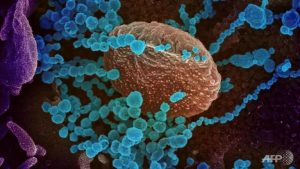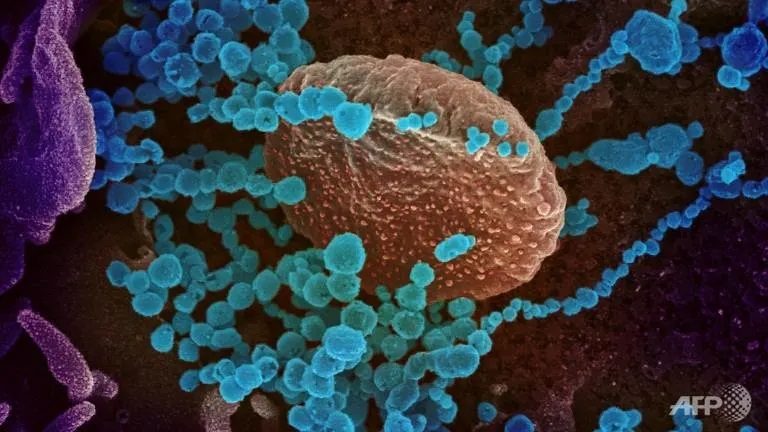
A scanning electron microscope image of SARS-CoV-2 (round blue objects) emerging from the surface of cells cultured in the lab.
WASHINGTON: US biotech firm Moderna said on Tuesday (Jul 14) it would enter the final stage of human trials for its COVID-19 vaccine on Jul 27, after promising early results were published in an influential journal.
Moderna was the first to start human testing of a vaccine for the novel coronavirus on Mar 16, about 66 days after the genetic sequence of the virus was released.
On Tuesday, the New England Journal of Medicine published results from the first stage of Moderna’s vaccine trial, which showed the first 45 participants all developed antibodies to the virus.
Dr Anthony Fauci, director of the National Institute of Allergy and Infectious Diseases, whose researchers developed Moderna’s vaccine candidate, called the results “good news,” noting that the study found no serious adverse events and the vaccine produced “reasonably high” levels of virus-killing or neutralising antibodies.
“If your vaccine can induce a response comparable with natural infection, that’s a winner,” Fauci said in a telephone interview. “That’s why we’re very pleased by the results.”
Under Phase 3, the trial will recruit 30,000 participants in the US, with half to receive the vaccine at 100 microgram dose levels, and the other half to receive a placebo.
It is designed to show whether the vaccine is safe and can prevent infection by the SARS-CoV-2 virus, or – if people still get infected – whether it can prevent the infection progressing toward symptoms.
If they do get symptoms, the vaccine can still be considered a success if it stops severe cases of COVID-19.
The study should run until Oct 27, according to its page on clinicaltrials.gov.
‘ENCOURAGING RESULTS’
Moderna had previously published “interim results” from the first stages of its trial, called Phase 1, in a press release on its website in May.
These revealed the vaccine had generated immune responses in eight patients, a result called “encouraging” by Anthony Fauci, director of the US National Institute of Allergy and Infectious Diseases, which is co-developing the vaccine.
But some in the scientific community said they would reserve judgment until they saw the full results in peer-reviewed form.
According to the new paper, 45 participants were split into three groups of 15 each to test doses of 25 micrograms, 100 micrograms and 250 micrograms.
They were given a second dose of the same amount 28 days later.
After the first round, antibody levels were found to be higher with higher doses.
Following the second round, participants had higher levels of antibodies than most patients who have had COVID-19 and gone on to generate their own antibodies.
More than half the participants experienced mild or moderate side effects, which is considered normal.
The side effects included fatigue, chills, headache, body ache and pain at the injection site.
“NO SERIOUS ADVERSE EVENTS”
“We didn’t see any events that are characterised as serious adverse events,” said Dr Lisa Jackson of Kaiser Permanente Washington Health Research Institute in Seattle and lead author of the study, referring to reactions that require hospitalisation or result in death.
Three participants did not receive their second dose.
They included one who developed a skin rash on both legs, and two who missed their window because they had COVID-19 symptoms, but their tests later returned negative.
“The results look pretty good and look pretty consistent,” David Lo, a professor of biomedical sciences at University of California Riverside told AFP.
But he cautioned that more work was needed to evaluate the vaccine’s safety – including making sure that it did not backfire by eventually making the immune system “tolerant” toward the real virus.
Amesh Adalja, an infectious diseases specialist at Johns Hopkins University, added it was encouraging that the participants developed high levels of an advanced class of antibodies.
He added, however: “You have to be very limited in how much you can extrapolate from a phase one clinical trial, because you want to see how this works when a person is exposed to the actual virus.”
RACE FOR A VACCINE
The Moderna vaccine belongs to a new class of vaccine that uses genetic material – in the form of RNA – to encode the information needed to grow the virus’s spike protein inside the human body, in order to trigger an immune response.
The spike protein is a part of the virus that it uses to invade human cells, but by itself the protein is relatively harmless.
The advantage of this technology is that it bypasses the need to manufacture viral proteins in the lab, shaving months off the standardisation process and helping to ramp up mass production.
No vaccines based on this platform have previously received regulatory approval.
Experts say a vaccine is needed to put an end to the pandemic that has sickened millions and caused nearly 575,000 deaths worldwide.
Moderna, currently in the middle stage, is considered to be in a leading position in the global race to find a vaccine.
China’s SinoVac is also at Phase 2.
Russian news agency TASS on Sunday announced Russian researchers have completed clinical trials on a vaccine, though they have not shared their data.
Scientists caution that the first vaccines to come to market may not be the most effective or safest.
The federal government is supporting Moderna’s vaccine with nearly half a billion dollars and has chosen it as one of the first to enter large-scale human trials. A successful vaccine could be a turning point for Cambridge, Massachusetts-based Moderna, which has never had a licensed product.
In June, Moderna said it selected the 100-microgram dose for its late-stage study to minimise adverse reactions.
At that dose, Moderna said the company is on track to deliver about 500 million doses per year, and possibly up to 1 billion doses per year, starting in 2021, from the company’s internal US manufacturing site and strategic collaboration with Swiss drugmaker Lonza.
“It’s a good first step,” said Dr William Schaffner, a vaccine expert at Vanderbilt University Medical Center who was not involved in the study.
“There’s nothing here that would inhibit one from going ahead to the Phase 2/Phase 3 trials,” he said. “A little fatigue and headache and myalgia (muscle pain) and pain at the injection site is a small price to pay for protection against COVID-19.”



